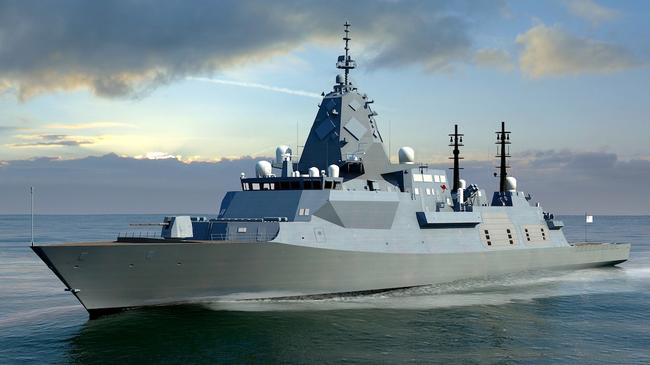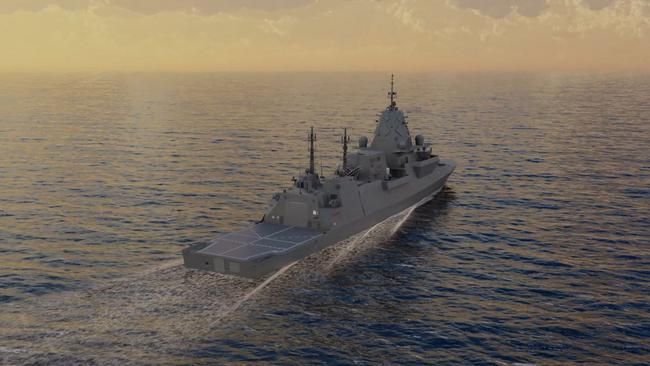BAE Systems Australia reveals major design change for Adelaide’s $45bn Hunter Class frigate project
The firm behind the $45bn Hunter Class frigate project has revealed a major design change at an international maritime exposition. Watch the video.
SA News
Don't miss out on the headlines from SA News. Followed categories will be added to My News.
Adelaide’s $45bn frigate project is poised to pivot into building a more lethal ship, bristling with dozens more missiles, after a major design change pitched to navy.
Hunter Class frigate shipbuilder BAE Systems Australia on Tuesday unveiled a design adding 64 vertical launch missile cells, taking the total to 96.
If accepted by navy, the evolved guided missile frigate would be built from the fourth of nine ships constructed at Osborne Naval Shipyard, in Adelaide’s northwest.


BAE Systems Australia managing director maritime Craig Lockhart said the change would deliver on the federal government’s promise of continuous naval shipbuilding, leveraging existing investment at an established yard.
The Hunter Class frigate project’s future has been under a cloud because of a surface fleet review, presented to Defence Minister Richard Marles in September but not set for release until early next year.
“If continuous naval shipbuilding is more than an obligation, then we‘ve just given the government and the Navy a reason to consider that consideration and honour the good work of the shipyard employees down at Osborne that have been that have been delivering it,” Mr Lockhart said.
“They’ve been knocking it out of the park and we’ve set up this enterprise to enable continuous naval shipbuilding.”
Speaking at Sydney’s Indo Pacific international maritime exhibition on Tuesday, Mr Lockhart said it had always been envisaged that the Hunter project would evolve across the three batches of three ships as technology and strategic circumstances changed.
He said BAE Systems Australia had been listening to the customer, navy, and addressed issues to make the ship more lethal.
“Whilst the contract said all nine ships were to be of the same variant, we never expected that to be the case because technology will advance quicker than our design process can keep track,” he said.
“Within this evolution of the Hunter design, by changing only three design zones and one construction module only, we can add another 64 cells to the current capability, taking the full ship cell capability, vertical launch, to 96 cells.

“At the same time, we are preserving a high level of anti-submarine warfare componentry on the ship.”
The evolved design has some changes to the propulsion system, which makes the ship faster, but a bit noisier, to meet the guided missile frigate capability.
Mr Lockhart said the design change, if accepted by navy, would mean very little for the more than 1800 BAE Systems Australia workers involved with Hunter, including at Osborne.
“What we want them to concentrate on is doing the job that they’re doing really well today – keep banging out that very high quality work, 97 per cent right first time on fabrication, 100 per cent on pipe work,” he said.
“According to the US independent panel, they have never seen such quality produced from a yard which, again, is testimony to the investment the Australian government made at Osborne.”
More Coverage
Originally published as BAE Systems Australia reveals major design change for Adelaide’s $45bn Hunter Class frigate project





